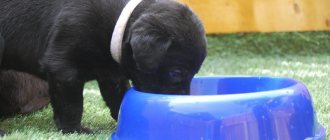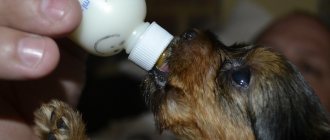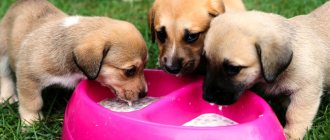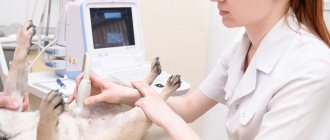Unfortunately, sometimes it happens that the bitch, for various reasons, cannot feed the puppies. For example, due to the fact that too little milk is produced, health problems or the mother’s abandonment of one of the children. If you want to check if your bitch has milk, you need to gently press on the breast nipple and see if a drop comes out. If this happens, then everything should be fine. You just need to make sure that all puppies have access to the nipple and that none of the little ones are pushed away by the others. The situation becomes more complicated when it turns out that there is no milk or there is too little milk to feed the entire litter. In this case, the puppy’s life will depend on you and artificial feeding of the puppies will be necessary.
You must take responsibility for feeding your small dog. The first step is to give him a milk replacer, this will provide the dose of essential nutrients and antibodies that the puppy should receive immediately after birth.
You cannot save on this product, because not only the growth and proper development of the puppy, but also its life depends on it.
Artificial feeding of a newborn puppy
A newborn puppy drinking milk from its mother provides itself with all the necessary nutrients. This allows him to grow and develop properly. This is why it is important not to wean them off breastfeeding too quickly. In the first three weeks of life, the puppy will only lie down, sleep and suckle to gain strength. Milk contains antibodies that are designed to protect the body from infections and germs.
It is very important that the puppy receives adequate artificial feeding in the first weeks of life in order to gain immunity. But sometimes a mother, for some reason, cannot feed her children. Then the most suitable milk replacer will be, which will not only satisfy the puppies’ hunger, but also provide them with all the necessary substances.
Ready-made milk replacer is a healthy and completely balanced meal. It should be rich in vitamins A, D and E, as well as calcium and phosphorus. Before you decide to select a product from store shelves, carefully read the label on the package and choose the one that has the richest composition.
If you're not sure what diet is right for your puppy, contact your veterinarian ahead of time and they can tell you what to look for.
Remember that puppies should absolutely not be given store-bought cow's milk because their stomachs cannot digest it.
In addition, it contains little protein and fat. Cow's milk contains large amounts of lactose, which can cause diarrhea and vomiting.
The benefits of baby food
Sometimes a treat can save a life.
For example, doctors often advise giving baby food to malnourished dogs to gain weight. This is the most gentle option for the gastrointestinal tract. There are not so many useful substances in the product, but it does not burden the stomach. This is very important for unhealthy animals. Theoretically, baby food contains a wide range of microelements. The delicacy can be called balanced in terms of vitamins, minerals, proteins, fats and carbohydrates. However, this is only true for a child’s body. Dogs have completely different needs. In addition, the ingredients in the treat are so highly processed that pets simply cannot reap all the benefits.
Powdered milk for puppies
Milk replacer, which is used when feeding puppies, comes in the form of a powder that is easily soluble in water. If you choose a good product, newborn dogs can have a digestibility rate of up to 95%.
Now you can buy powdered milk in almost any pet store, as well as online, which will greatly help you prepare for the situation when the bitch cannot feed her puppies on her own. This product will also help if the mother died during childbirth or when she abandoned her children. Then powdered milk is the only solution that will increase the chances of survival of the puppies. It has the properties of a complete and balanced first food. Contains essential protein, vitamins, and elements such as copper, selenium and zinc because they help boost immunity and strengthen the immune system in puppies.
Currently, a wide selection of products of this type is available, differing not only in brand, but, above all, in composition. This is why studying labels is so important. Thanks to this, you can be sure that you have chosen the best product, as close as possible to real breast milk.
How to properly give dogs baby food
From the above, we can draw an obvious conclusion: baby food cannot become the only dish on the dog’s menu. Even if it contains a lot of meat, the product is not suitable due to its consistency and balance of substances. However, if you wish, you can pamper your companion.
You should choose purees without unnecessary additives. It is better to give the treat separately and not mix it with food. This is especially true for those dogs that eat industrial food. Optimal serving size: 1–2 tbsp. l. It is advisable to pamper your ward only 1-2 times a week. Do not under any circumstances try to put your companion on a mono-diet!
Baby food is not the best product for dogs. However, occasionally you can offer it to your shaggy friend. However, there are much healthier alternatives. For example, you can give your pet boiled pumpkin and carrots. They are sweet and contain many vitamins and microelements.
Preparing milk for puppies
Powdered milk should be administered according to the dosage recommended by the manufacturer or as directed by your veterinarian. Don’t forget to give ready-made milk to puppies at the right temperature - this is 38 degrees. Be especially careful that it is not hot.
Powdered milk is easy to dilute, so it should be prepared immediately before feeding. The puppy drinks from 10 to 25 grams at a time, depending on the breed. Unfortunately, you have to prepare for some pretty high costs associated with this. If there are eight small hungry puppies in a litter, and each of them drinks up to 150-200 grams of milk per day, think about how much powdered milk you will have to prepare.
However, remember that meal replacements in the form of powdered milk are the only way to save lives and feed puppies who cannot get food from their mother. Without your help and constant feeding, they will not be able to survive.
Could it get bad?
In fact, a dog can become ill from any food if it has overeaten or tried it for the first time (out of habit).
If you decide to add baby food to your diet, then in the next couple of hours be prepared to put aside everything you are doing to monitor the dog’s condition. The reaction may vary.
Some dogs tolerate new food calmly, even better than they would like: skin problems disappear, the dog becomes more energetic, etc.
But it also happens the other way around. A dog is a predatory creature by nature, so it does not assimilate plant foods well, including the vitamins it contains.
Therefore, if you notice that your pet is feeling unwell (lethargy, nausea), it is best to temporarily remove such supplements from his diet, or eliminate them altogether.
Reviews
Looking through different forums and websites, you can see a division into pros and cons. Based on everything we’ve read, we can only say one thing: as many people, so many opinions.
Each type of feeding depends on the animal’s well-being, allergic reactions and contraindications.
One man expressed his opinion like this: “If he eats, then why not?” But is this right? If you look at it, many dogs don’t eat anything, but their health doesn’t get better from it.
The woman said that “You need to feed the dog what you eat yourself - it will be healthier.” It turns out funny, because we also eat food that is far from healthy.
Another argued that “Absolutely not. There are special canned food, porridge and mixtures for puppies and adult dogs.”
In fact, she is right about something. Why experiment with what is intended for a child, if there are specially developed and tested mixtures for our animals? Yes, the price may be steep, but you don’t have to worry so much about your health.
Newborn care
Services for newborns When newborn animals appear in the house, the life of the owners changes, new worries, anxieties and interests appear. Despite the fact that the mother is fully responsible for the newborns, providing them with everything they need (warmth, food and safety), the owners should not lose their vigilance, since the mortality rate during this period is very high. Let's look at caring for cubs that are naturally born or orphaned.
Caring for newborn animals
Newborns are kittens or puppies under 10 days of age. Regardless of how they were born, all cubs are examined to identify pathologies (limb deformities, palate failure, artesia and other abnormalities). Newborn animals are completely helpless in this world, and the main task of the owners is to constantly monitor the condition of the mother and cubs until they grow up. When caring for newborn animals you must:
- make sure that the mother feeds them every 1.5-2 hours;
- make sure that the female has accepted all the babies, and if she rejects one of the babies, then it can be moistened with placental fluid and brought to the mother;
- check that there is no discharge from the ears, eyes or nose; - make sure that all newborns suck the nipple; if one of them cannot find it, then the baby should be attached to the nipple and, squeezing with your fingers, express a little milk;
- control the temperature of the environment; on the first day the temperature should not exceed 33 °C, and in the next three days it should be reduced to 30 °C;
- Weigh regularly, which allows you to monitor the ability of the cubs to gain weight; healthy babies gain up to 10% weight per day.
Caring for orphaned kittens and puppies
If the mother died during childbirth, then caring for newborn puppies and kittens consists of creating all the necessary conditions for the survival of newborns.
Nutrition.
Breast milk is the best option, but in case of its absence, milk is replaced with an artificial formula, which is balanced in the content of carbohydrates, proteins, fats and vitamins. For each mixture there is an optimal feeding regimen that should be followed.
Ensuring temperature conditions.
The ambient temperature during the newborn period should be 30-32 °C; to maintain it, it is best to use an infrared lamp, which avoids overheating, or a heating pad.
Ensuring normal bladder and bowel emptying.
After each meal, the cubs definitely need to massage their tummy in order to teach them to urinate and defecate. Massage should be done until they begin to do it on their own.
Caring for newborn kittens and motherless puppies is serious work that requires a lot of time and effort. Cubs who have lost their mother need close attention, since without mother's milk they are more prone to various diseases. At the slightest suspicion of illness, loss of appetite, bloating or drooping of the tummy, you should immediately contact a veterinary clinic, especially when caring for newborn Yorkie puppies.
Features of caring for newborn Scots kittens
Newborn healthy Scottish kittens behave quietly during the first weeks of life: they eat, sleep and rarely squeak, unless they are in pain. In kittens of the Scottish and British breeds, a disease is often recorded that occurs as a result of incompatibility of the blood groups of the mother and father. Such cubs develop anemia, the kittens become lethargic and death can occur within 24 hours. If the possibility of this disease is suspected, babies must be urgently weaned from mother's milk and transported to an oxygen chamber.
| Care for newborns, starting from the 2nd day of life, per day: | |||
| when kept with mother | one animal | for free | |
| with artificial feeding up to 10 days (without food cost) | first animal in litter | 1950 | rub |
| with artificial feeding up to 10 days (without food cost) | each subsequent animal in the litter | 990 | rub |
| for artificial feeding over 10 days (without food cost) | one animal | 990 | rub |
| with intensive care and constant monitoring | one animal | 2850 | rub |
| Inspection of a litter of up to 10 puppies | one manipulation | 1650 | rub |
| Inspection of litters of over 10 puppies | one manipulation | 2200 | rub |
Creating the required temperature regime
Puppies, unfortunately left without their mother, are immediately exposed to various dangers. One of these dangers is their overheating or, conversely, hypothermia.
The baby's body is not yet fully formed and cannot regulate its body temperature. Usually this function is performed by the female. If the puppy is cold, he moves closer to his mother and warms himself against her; if he feels that he has warmed up, he moves away.
Therefore, an important point is to artificially create the thermal regime necessary for the puppy. It is important to remember that a drop in a puppy’s temperature to 34 0C leads to irreversible consequences, and sometimes even to their death.
If the search for another lactating female is successful, then there will be no problems with the temperature regime. If not, then you will have to make something like an incubator for the puppy. You need to find an ordinary box and place a lamp above it, the flow of light of which must be directed into the box.
It is necessary to organize everything so that the puppy can leave the box if he gets hot, since overheating is also dangerous for his health.
In addition to this method, you can also warm the puppies with your warmth by placing them on your stomach. However, this takes too much time.
Another option is to use special electric heating pads that are placed under the box. They need to be placed so that there is room in the box for the puppy to climb into if it gets too hot.











